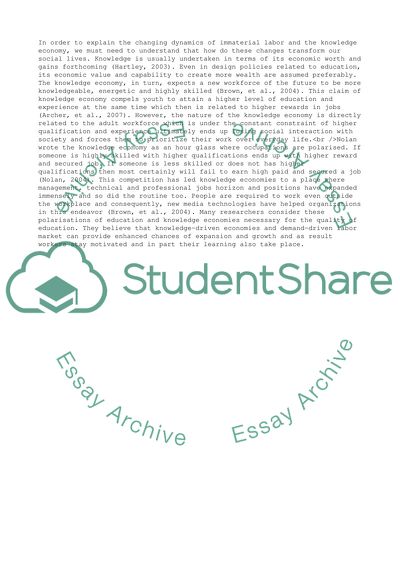Cite this document
(The Tendency of Putting Work at the Heart of Daily Concerns Essay Example | Topics and Well Written Essays - 1750 words, n.d.)
The Tendency of Putting Work at the Heart of Daily Concerns Essay Example | Topics and Well Written Essays - 1750 words. https://studentshare.org/management/1809176-according-to-melissa-gregg-2011-xi-new-media-technologies-encourage-and-exacerbate-an-older-tendency-among-salaried-professionals-to-put-work-at-the-heart-of-daily-concerns-often-at-the-expense-of-other-sources-of-intimacy-and-fulfillment
The Tendency of Putting Work at the Heart of Daily Concerns Essay Example | Topics and Well Written Essays - 1750 words. https://studentshare.org/management/1809176-according-to-melissa-gregg-2011-xi-new-media-technologies-encourage-and-exacerbate-an-older-tendency-among-salaried-professionals-to-put-work-at-the-heart-of-daily-concerns-often-at-the-expense-of-other-sources-of-intimacy-and-fulfillment
(The Tendency of Putting Work at the Heart of Daily Concerns Essay Example | Topics and Well Written Essays - 1750 Words)
The Tendency of Putting Work at the Heart of Daily Concerns Essay Example | Topics and Well Written Essays - 1750 Words. https://studentshare.org/management/1809176-according-to-melissa-gregg-2011-xi-new-media-technologies-encourage-and-exacerbate-an-older-tendency-among-salaried-professionals-to-put-work-at-the-heart-of-daily-concerns-often-at-the-expense-of-other-sources-of-intimacy-and-fulfillment.
The Tendency of Putting Work at the Heart of Daily Concerns Essay Example | Topics and Well Written Essays - 1750 Words. https://studentshare.org/management/1809176-according-to-melissa-gregg-2011-xi-new-media-technologies-encourage-and-exacerbate-an-older-tendency-among-salaried-professionals-to-put-work-at-the-heart-of-daily-concerns-often-at-the-expense-of-other-sources-of-intimacy-and-fulfillment.
“The Tendency of Putting Work at the Heart of Daily Concerns Essay Example | Topics and Well Written Essays - 1750 Words”. https://studentshare.org/management/1809176-according-to-melissa-gregg-2011-xi-new-media-technologies-encourage-and-exacerbate-an-older-tendency-among-salaried-professionals-to-put-work-at-the-heart-of-daily-concerns-often-at-the-expense-of-other-sources-of-intimacy-and-fulfillment.


